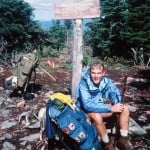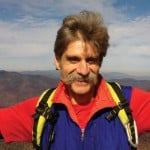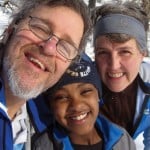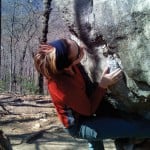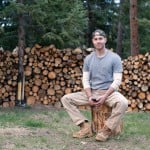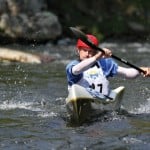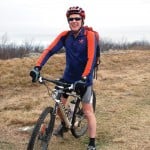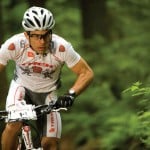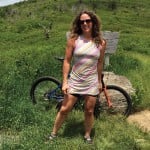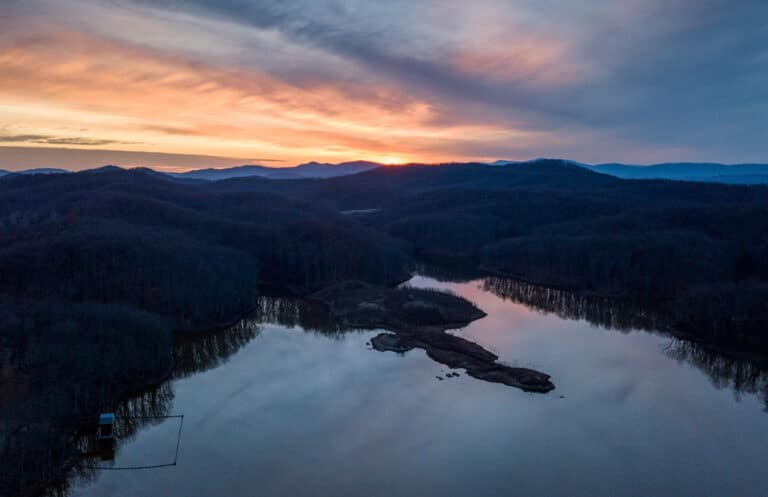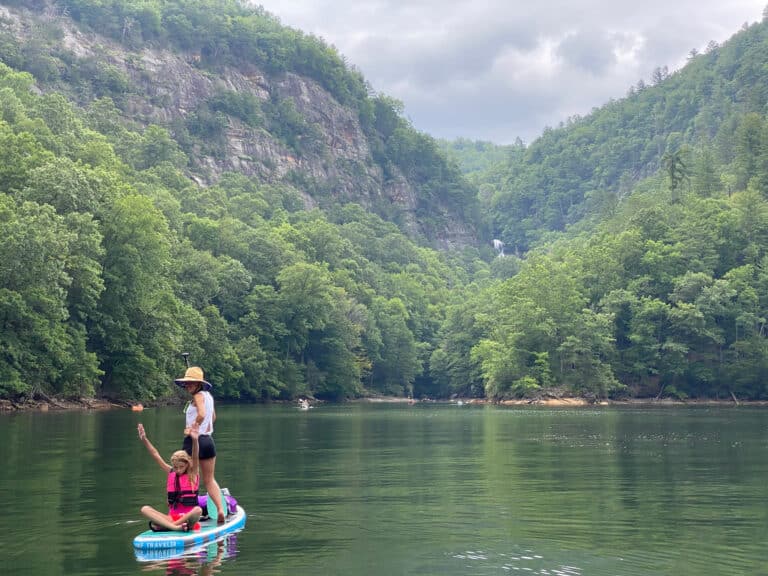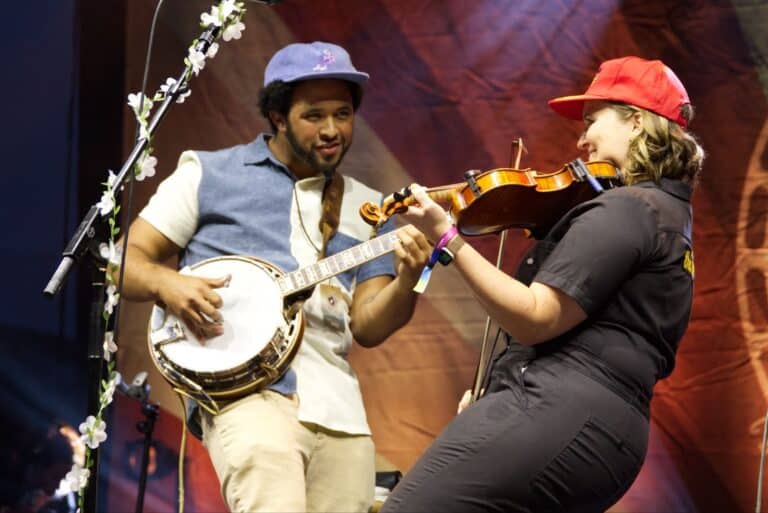From BRO’s very first writers and editors to record-setting, trail running legends and thru-hiking gurus, we’ve compiled the latest and greatest info on some of the region’s biggest outdoor personalities.
Jeb Tilly was one of BRO’s first editors, and the work he put in during the magazine’s earliest years formed a foundation for what it would become twenty years later.
Favorite memories?
I’ll never forget sleeping on the rim of Ambassador Buttress in the New in the early 90s, and meeting the tiny group of people who’d discovered climbing there when the place was still pretty much terra incognita to the rest of the world.
What I remember most about BRO is the pleasure of creating something totally new. In 1995 the vibe and energy in outdoor sport was mostly a Western thing. In the East, there were little pockets of people who had passion for climbing, bouldering, ultrarunning, hang gliding, mountain biking, cross-country and telemark skiing and all that. My job was to seek those people out. It was the best job ever: go interview John Markwell about the origins of the Gendarme at Seneca Rocks. Go spend a weekend with Gene and Maura Kistler and see what’s new at the New. Check in on Thomas Jenkins and the Hugh Jass guys. We were pulling the little tribes together, bringing their stories to life.
Back then Rob Jiranek and I sold the ads, wrote the stories, took the photos, and delivered the mag in an old white Ford van to all the little markets in the Shenandoah Valley. We’d literally take a copy to people’s door and say, “Here’s the piece we wrote about you.” It was great.
What are you doing today?
I live in the mountains above Boulder, Colo. and run my own brand strategy company. Brand positioning, innovation, advertising —that kind of stuff. I have a seven-week-old kid named Woods and a wife named Ashley, who was head of sales at Blue Ridge Outdoors in the late 90s, so maybe my most memorable BRO moment was meeting my wife.
Biggest changes OR discoveries?
I don’t wander as much as I used to, which is a shame because I think there’s a lot of value in wandering. The pace of life and social media make it harder these days. I still firmly believe in the power of understanding and bringing to life people’s stories. My business is based on it.
It’s a lot more important and meaningful to be present in the experiences I have than it is to be prepared for them. I’ve spent tons of time training for stuff and of course I see value in that, too. But in the end it’s really about being there, whether it’s a long route in the mountains or a diaper change. Even if you totally f*ck it up.
Lecky Haller, one of Western North Carolina’s most heralded and accomplished canoeists, is known for an impressive whitewater career that lasted from the early 80s to the early 2000s and included four medals—one gold, two silver, and one bronze—at the International Canoe Federation Canoe Slalom World Championships.
Favorite memories?
In canoe slalom, I got to race in two Olympic Games, narrowly missing a medal with Jamie McEwan in 1992 in Barcelona. Other memorable moments were closer to home: night mountain bike rides in Bent Creek; paddling up to the castle and back on the French Broad; a snowy winter day on top of Black Balsams; canoe camping on the Chattooga.
What are you doing today?
I have been a football, cross country, wrestling, skiing, lacrosse, and weightlifting coach, and I am introducing my two wonderful 9- and 13-year-old daughters to as many of the great things that nature can teach them as possible.
Biggest changes OR discoveries?
I’m mostly the same. I marvel daily over all the incredible things in nature and the outdoors. I maybe used to be a little more nationalistic as in the US will kick your butt. Now I think we really need to all pitch in to save this earth of ours. It’s not who wins; it’s how we win.
The biggest lesson in life is maybe to just be nice. Nice to yourself and nice to others and try to understand where we all come from and what others are going through. Don’t be selfish—except maybe every once in a while if the ice cream is really good.
Chris Hipgrave, hailing from Purely, England, is a whitewater legend. A former USA Wildwater Team athlete with 38 years of whitewater experience, Hipgrave now plays an important role in the kayak instruction programs at the Nantahala Outdoor Center (NOC) in Western North Carolina.
Favorite memories?
Representing the USA at my first Wildwater World Championships and World Cups was incredibly heavy and a moment I am very proud of. I ended up representing the USA Wildwater Team for 11 consecutive years and raced all over the globe on some amazing whitewater and with some great people.
What are you doing today?
I’m the Paddlesports and Outdoor Schools General Manager at the Nantahala Outdoor Center. The NOC was one of the major draws to this area when I moved from England back in 1991, so it’s fitting that I would end up here. The NOC team is so passionate about introducing people to the outdoors and over the years I’ve seen that passion positively change so many lives.
Biggest changes or discoveries?
My love for all things paddling is unwavering, but I appreciate other disciplines and aspects of the sport more now rather than my narrow whitewater focus of the past. The lure of surfski paddling has been a particularly fun journey that I never would have imagined I’d embark on. I hope I can keep charging ahead to create new amazing adventures. If I leave this world with $1 to my name but a mind full of great memories, that’s just fine with me.
David Horton was the East’s ultrarunning pioneer. He set several speed records and won multiple 100-mile ultra marathons, including two victories at the Hardrock 100.
Favorite memories?
Setting the speed record on the A.T., being the first American finisher of the Barkley 100 Miler, directing 80 ultras, and most recently, finishing the 2,700-mile Tour Divide Mountain Bike race.
What are you doing today?
These days I have switched my focus from ultra running to mountain biking, and I plan on doing the Tour Divide in this summer. I had a seven-way open heart bypass surgery two years ago, and a total knee replacement just 7 months ago. I am in my 35th year of teaching at Liberty University and still directing three ultramarathons.
Biggest changes or discoveries?
One thing I’ve learned is that once you make a commitment, you have to fulfill that commitment. Another is that life goes on. I am now a mountain biker and not running at all.
Chris Eatough came to the United States from England in the early 90s. After attending Clemson University, he went on to pilot an impressive professional mountain biking career that includes six 24-hour Solo World Championships and five 24-hour Solo National Championships. In addition, he is the 2007 24 Hour of Moab Champion and the winner of ten 100-mile mountain bike races.
Favorite memories?
Traveling, riding, racing, and hanging out in amazing locations all over the world and sharing it with teammates.
What are you doing today?
I live in Howard County, Md., with my wife, Allison, and two kids. I work for the county as the bicycle and pedestrian coordinator. It’s a great place to live and I enjoy adding to the quality of life by making our area more bike- and walk-friendly. Of course, I still ride bikes just about every day.
Biggest changes or discoveries?
I am less extreme now. I used to push the limits of endurance with training and racing to see how far I could go and to get the very best out of myself. I still consider honesty to be very important. I always raced hard but fair. Now I value honesty more than ever, especially with my family. Balance is important and winning isn’t everything. I had some great success with racing, but I was always able to walk away with my health and my reputation intact.
Dan ‘Wingfoot’ Bruce completed seven A.T. thru-hikes and published an authoritative series of A.T. guidebooks. He also worked tirelessly to preserve the trail he loved.
Favorite memories?
Of all the A.T. thru-hikes I did, I would have to say the very first one was the most memorable. It was like falling in love for the first time. You never forget that.
I hiked over 25,000 miles of hikes in my day, but the highlight of it all was the service and the environmental activism. I helped conserve 25 miles of land bordering the A.T., a large swath of land on Max Patch near the northern end of the Smoky Mountains, and Saddleback Mountain in Maine which was being threatened by a gravel quarry at the time.
What are you doing today?
I left Hot Springs, N.C., and the Appalachian Trail community and stopped maintaining my guidebooks in 2007. I left because I didn’t like the way that interactive technologies like cell phones were changing the nature of the trail, and I just preferred to remember it as it was before all of that. Now I am the primary caregiver for my 99-year-old mother. I am also working on a book about my many Appalachian Trail adventures called Walking with Wingfoot.
Biggest changes or discoveries?
Sadly, I have lost my urge to fight for the environment. It pains me to say it, but I believe that, worldwide, the fight for the environment is lost. What I’ve learned is this: If hiking the A.T. is not the most important thing to you at that very moment, then go do what is. If it is, then immerse yourself in it completely with passion and fervor.
Jessica Tomasin was BRO’s first climbing columnist. These days, she works in the music business and was recently named Entrepreneur of the Year by the Asheville Chamber of Commerce.
Favorite memories?
Climbing in the New River Gorge and the Red River Gorge for the first time.
What are you doing today?
I have been managing the Echo Mountain Recording Studio for the last eight years, and I have my own production company that produces events and festivals.
Biggest changes or discoveries?
An injury sidelined me for several years. I’m finally just getting back to running and climbing. But instead of spending every minute outdoors, I am also a mentor to a family, growing my business, more involved in projects that benefit my community as a whole. I’ve learned that you don’t have to go full speed to have a great adventure, and to trust where your path leads you. Slow and steady wins the race.
Laird Knight. Twenty-four hour mountain bike racing began with this guy. Knight created the first race in Canaan Valley, W.Va., back in 1992, which eventually led to his induction into the Mountain Biking Hall of Fame.
Favorite memories?
My first ride on a mountain bike in 1983. I had seen mountain bikes in stores, but there was no way as a college kid that I could afford one. It wasn’t until I moved to Davis, W.Va., and started Blackwater Bikes that I finally got to ride one. I was not disappointed. What a ride. What a day. I’ll never forget it.
In 2002, I learned that I was going to be inducted into the Mountain Bike Hall of Fame. I remember thinking, “Wait, I’m not done yet!”
What are you doing today?
I married and moved to Morgantown, W.Va., and my wife and I adopted three siblings from Ethiopia. Being a dad to these three kids has been the most meaningful and joyful experience of my life. My new sport-love is soccer. I play in two adult leagues, coach a team, and all my kids play soccer at a very high level.
Biggest changes or discoveries?
There is a certain wisdom that comes with age and it’s delicious. I take more responsibility for my life. I don’t blame others or my past. I’m more grateful than I’ve ever been. I’m enjoying life at a whole new level. Most importantly, I’ve learned that I can’t do it all myself, that I need other people. I’ve learned so much from my mistakes, and I’ve made some big ones. I didn’t capitalize on the success of 24-hour racing right off the bat, and I let copycat competitors move in. The most inspirational thing that I’ve learned and experienced in all my endeavors is this: When you know where you want to go, people will help you get there. It’s just amazing to me how, all along the way, people put a shoulder into my vision.
Graham Averill
Graham Averill was a staff writer for Blue Ridge Outdoors and continues to write freelance for BRO and other regional and national outdoor publications.
Favorite memories?
I took telemark camp at Whitegrass, hunted Bigfoot in Virginia, and got way lost in the Smokies. A few times.
What are you doing today?
Now I’m freelancing full time, writing for a handful of national adventure titles. I’m still writing for BRO too. I just took over the gear page, which I’m really excited about. I also spend a lot of time hanging out with my kids. They’re becoming little adventurers themselves.
Biggest changes or discoveries?
Well, when I started working at BRO, I didn’t have any kids, so my life is nothing like it used to be. There’s definitely more balance now, and I have to think about what taking an assignment that might be dangerous would mean for my family. Maybe that means I’m more mature now? Probably not.
Bettina Freese was BRO’s very first mountain biking correspondent. Bettina recently published an article in Yoga magazine and is currently working on one for Massage & Bodywork. She as an instructor at the Asheville School of Massage & Yoga and is expanding her business as a continuing education provider. She is compiling a book based on her mother’s demise to Alzheimer’s. Her love is still for mountain biking, but more with her kids. Watching them ride makes her cry in gratitude. She runs the mountain bike club at Evergreen Charter School. Her outdoor adventures are mainly with her kids, who love Moab and the Pisgah National Forest. They spend their summer weekends in a tent. She took up running, which has led her to weekends of raucous laughter doing relay races clad in leopard print.
Favorite memories?
When I was doing a monthly column for BRO, biking was a creative space. Every time I was on my bike, I saw the world differently. To me it was slightly amusing that I could get paid to do something I loved so much.
What are you doing today?
Now that my kids are in school and I can occasionally get 15 minutes to myself, I’m cultivating my writing career again—but not just outdoor writing. I’m just trying to send things out and see where it will take me next, and I’m actively working on a book.
Biggest changes or discoveries?
I still feel like I am 10 years old, and sometimes I’m amazed at the level of responsibility I’m allowed. Inside I’m just the same adventurous person I was when I first started writing for BRO. These days I ride motorcycles, teach an adult gymnastics class, and do a running relay with a leopard print clad group called the Pussyfooters. I guess I just like to keep it fresh. One of the biggest things I try to focus on is living in the moment and not building too much on the past. Be present and it will open the new doors for you. There are new doors opening every day.
In Memoriam
Bill Irwin
In 1990 Bill Irwin became the first and only blind adventurer to ever complete a thru-hike of the Appalachian Trail without human assistance. He did have assistance from his seeing eye dog, a German shepherd appropriately named Orient, but had no GPS, no map, and no compass.
After his historic hike, Irwin retired to Maine with his wife Bebra where they lived on 72 acres with a view of Katahdin. He also published a book, now in its eleventh printing and still selling copies, called Blind Courage, in which he chronicled the events that brought him to the culmination of his nine-month journey.
Sadly, Irwin lost his battle with prostate cancer in March 2014.
Shannon Christy
Elite kayaker Shannon Christy was only 23 years old when she embarked on her final paddle down the Potomac River. Just like any other whitewater expert, she knew her chosen craft was fraught with peril, but she didn’t live in fear of the consequences.
Chirsty, who set off from Greenville, S.C. to compete in the Potomac River Festival’s Great Falls Race in July 2013, became pinned underwater and drowned in one of the race’s most treacherous sections.
“I really believe that her faith in her future diminished any fear that she had in any area of her life,” said her mother, Kim Christy in an interview with The Washington Post. “She didn’t fear the future; she didn’t fear the river.”
“Cookie Lady” Jane Curry
During the 1976 Bike-centennial, when thousands of bikers embarked on a cross-country journey from Virginia to Oregon along the now infamous Trans-America trail, Afton, Virginia resident Jane Curry emerged as a steadfast friend to trail-weary bikers. Her hospitality often included a hot shower and always came with fresh-baked cookies. Over the span of some three decades, she attained legendary status in guidebooks and through word of mouth within road cycling circles. By the time she passed away in June 2012 at the age of 91, she had baked cookies for more 13,000 cyclists from around the world.

